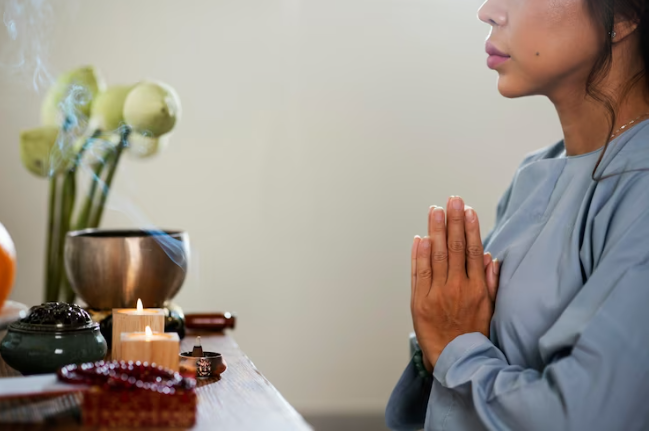Are you caught in the complicated conundrum of religion vs. spirituality? With the rise of secularism and the decline of organized religion, many people are exploring spirituality outside of traditional religious institutions. However, there is still a significant number of individuals who find solace and guidance in their faith. The question is, how do we bridge the gap between the two?
Defining religion and spirituality is the first step in understanding the differences and similarities between the two. Religion is a set of organized beliefs, practices, and rituals that typically involve a higher power or deity.
Spirituality, on the other hand, is a personal quest for meaning and purpose in life. It involves a connection to something greater than oneself, but doesn’t necessarily involve the structure and rules of a religion.
In this article, we’ll explore the benefits and limitations of both religion and spirituality, and how you can find common ground to achieve a fulfilling spiritual experience.

Defining Religion and Spirituality
Understanding the distinction between religion and spirituality can provide a greater depth of insight into our personal beliefs and values.
Religion can be seen as a tradition or belief system that is structured around a set of doctrines, practices, and rituals. It’s often associated with organized institutions and a hierarchical structure. Religion offers a framework for interpreting the world and our place in it, and provides a sense of community and belonging for its adherents.
On the other hand, spirituality can be seen as a faith or practice that is more personal and individualized. It often involves a search for meaning and purpose in life, and a connection to something greater than oneself.
Spirituality is not necessarily tied to any particular religious institution or doctrine and can be expressed in a variety of ways. It can involve practices such as meditation, prayer, or self-reflection, and can be seen as a way of cultivating inner peace and harmony.
Overall, while religion and spirituality may share some similarities, they have distinct differences that are important to understand in order to bridge the gap between the two.
Understanding the Differences
You can’t fully grasp the contrast between religion and spirituality until you’ve experienced both firsthand. Exploring distinctions is key to understanding the differences between the two.
Religion is typically associated with organized practices and structured beliefs. It’s a set of rules and regulations that guide a person’s spiritual journey.
In contrast, spirituality is a more personal and subjective experience. It’s about connecting with something greater than yourself and finding meaning in life. Spirituality often involves practices like meditation, mindfulness, and introspection.
Despite these differences, there are also similarities between religion and spirituality. Both seek to answer life’s big questions and provide a sense of purpose. Both encourage personal growth and self-awareness. Both can offer comfort during times of struggle or hardship.
It’s important to recognize that while religion and spirituality may have different approaches, they both have value and can coexist. Embracing similarities and understanding differences can help bridge the gap between the two and create a more inclusive and accepting society.
Benefits and Limitations of Religion and Spirituality
As you explore the benefits and limitations of incorporating both religion and spirituality into your life, you may discover that each offers unique advantages and challenges that can ultimately enhance your personal growth and understanding of the world around you.
Religion provides structure, community, and a clear set of beliefs and practices that can guide your daily life and provide comfort in times of difficulty. It provides a sense of belonging and connection to something greater than yourself, which can be especially important in times of crisis or uncertainty. However, religion can also be limiting in its rigidity and exclusivity. It may not allow for exploring perspectives and beliefs outside of its own doctrine, which can hinder personal growth and limit understanding of other cultures and viewpoints.
Spirituality, on the other hand, allows for a more individualized approach to connecting with the divine and exploring one’s own beliefs and values. It can be more flexible and adaptable to personal growth and change, allowing for a more open-minded and inclusive perspective. However, spirituality can also lack structure and community, which may leave individuals feeling disconnected or lost.
Bridging the Gap: Finding Common Ground
Finding a common ground between different belief systems can be a challenging but rewarding experience for those seeking to broaden their horizons.
Overcoming stereotypes and embracing diversity are crucial in building bridges between religions and spiritualities. It’s important to recognize that no single belief system has a monopoly on truth. Each religion and spirituality has its unique strengths and weaknesses, and it’s by embracing these differences that we can learn from one another and find common ground.
One way to bridge the gap between religion and spirituality is through dialogue and understanding. Respectful communication and active listening can help us appreciate each other’s beliefs and values. This can lead to greater empathy and compassion, which are essential in building a more harmonious and peaceful world.
By finding common ground, we can also work together towards common goals, such as social justice, environmental sustainability, and the promotion of human rights. Ultimately, the journey towards bridging the gap between religion and spirituality requires a willingness to learn, grow, and evolve together.
Achieving a Fulfilling Spiritual Experience
Discovering a fulfilling spiritual experience can bring a sense of joy and purpose to your life, allowing for personal growth and a deeper connection to the world around you.
To achieve this, you can start by exploring different meditation practices that resonate with you. Meditation can help you find inner peace, reduce stress and anxiety, and improve your overall well-being. Whether it’s mindfulness meditation, loving-kindness meditation, or transcendental meditation, there are many techniques to choose from.
Another way to achieve a fulfilling spiritual experience is by connecting with nature. Spending time in nature can help you feel grounded, calm, and connected to the universe. You can go for a hike in the mountains, take a walk on the beach, or simply sit under a tree and observe the beauty of nature.
You can also practice eco-meditation, which involves focusing on the interconnectedness of all living beings and the environment. By doing so, you can develop a deeper appreciation for the natural world and feel a sense of oneness with everything around you.
Conclusion
Congratulations on reaching the end of this article! By now, you should have a clear understanding of the differences between religion and spirituality, as well as their respective benefits and limitations.
It’s important to recognize that both have their place in society and can offer individuals a sense of purpose and connection.
One interesting statistic to consider is that according to a study by the Pew Research Center, the number of Americans who identify as religiously unaffiliated has grown significantly in recent years, with 26% of adults now identifying as atheist, agnostic, or ‘nothing in particular.’ This reflects a growing trend towards spirituality that is not tied to traditional religious institutions.
Whether you choose to follow a specific religion or embrace a more personal spirituality, the key is to find what works for you and brings you a sense of fulfillment.
Remember, there’s no right or wrong way to approach spirituality, and it’s important to remain open-minded and respectful of others’ beliefs. Keep exploring and discovering what resonates with you, and you’ll be on your way to a more fulfilling spiritual experience.



